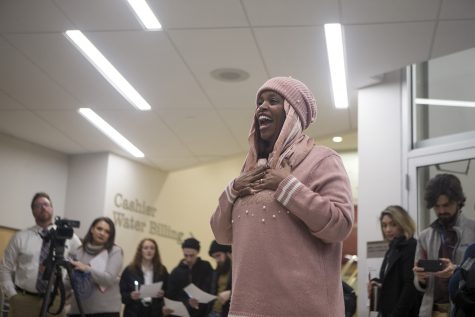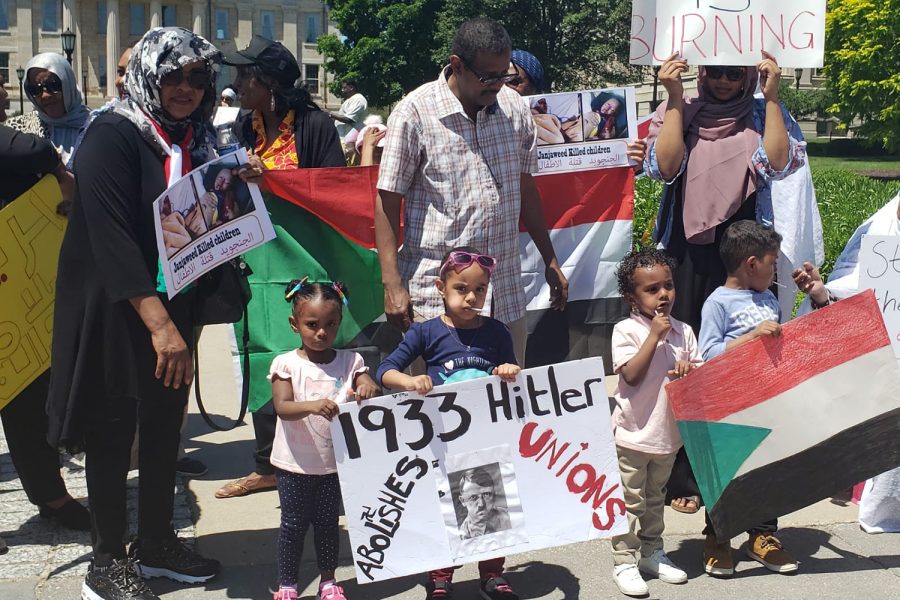Iowa City’s Sudanese population calls for U.S. response to Sudan crisis
City Councilor Mazahir Salih is in Sudan as hundreds of Iowa City Sudanese Americans try to bring attention to the ongoing crisis.
June 16, 2019
Although thousands of miles away from the country, members of the local Sudanese population feel the effects of ongoing turmoil and bloodshed in Sudan.
Iowa City City Councilor Mazahir Salih is now in Sudan, albeit with limited means of communication.
“I don’t know if you’ve been paying attention to the news, but it’s not very good coming out of Sudan,” Iowa City Mayor Jim Throgmorton said in a June 4 City Council meeting. “We certainly hope that Mazahir is safe and healthy and that her friends are as well.”
The first Sudanese-American to be elected to public office in the U.S., Salih is heavily involved in labor issues with such organizations as the Center for Worker Justice.

Worker Justice Center Executive Director Rafael Morataya said Salih is in Sudan on vacation and they last spoke two weeks ago.
In April, the Sudanese people ousted their dictatorial president of 30 years, Omar al-Bashir, with the help of a military coup after waves of protests against rising food costs and fuel shortages.
A military council said it had taken control of the country as a transitional government to promised civilian-led elections. Transition talks began to break down, and protests started again, marked with violence. The country is now under an internet and social-media blackout.
“More people definitely need to know what’s happening in Sudan,” Morataya said.
The Center for Worker Justice works extensively with immigrant communities in the area, including the Sudanese population. The Iowa City and Coralville area is home to hundreds of Sudanese citizens and residents.
On June 8, more than 200 Sudanese Americans and others in the Iowa City and Coralville area protested downtown in response to military-backed violence in Sudan.
RELATED: UI student works to connect immigrant population in IC
The frustrations among Sudanese Americans in Iowa City were on display in December 2018, when dozens took to the Pentacrest and downtown to demonstrate solidarity with protests against the now-deposed Sudanese president.
One of the local protesters was Justice Center board member Fatima, a translator for such nonprofits as Iowa City Compassion and a member of Iowa City’s Sudanese-American population. [Editor’s note: She requested that her surname be withheld in the interest of the safety of friends in Sudan.] In the U.S., she said, advocates protest and pressure local politicians and members of Congress to support the Sudanese people with humanitarian aid and protections for Sudanese Americans.
In Sudan, the country’s people protested because people were hungry and there were no jobs, Fatima said.
While she has lived in the U.S. for the past 16 years, Fatima has stayed connected to Sudan through Facebook pages and group chats.
On her phone, she has saved a collection of videos and photos from the past year, ranging from happy to grim — some displaying graphic images of violence committed against protesters.
“If I could meet any of these militia men, I would ask them, ‘You don’t know these people. You don’t know anything about them. How can you just kill them?’ ” she said with tears in her eyes after watching a video of a group of men pulling a body from the Nile River.
In addition to participating in protests in Iowa City and in Washington, she works on a series of art pieces to bring attention to the situation in Sudan.
“The situation in Sudan is not humanity,” Fatima said. “There is no life over there.”



